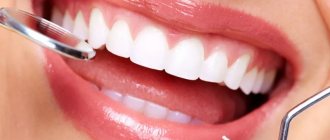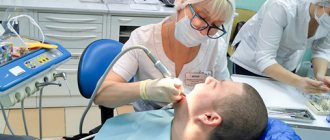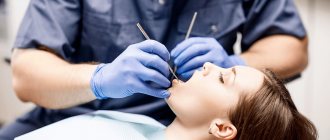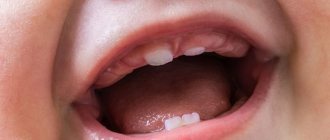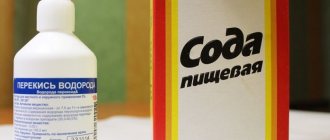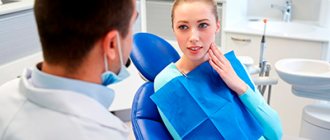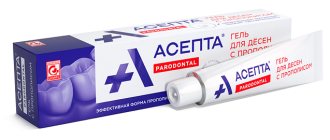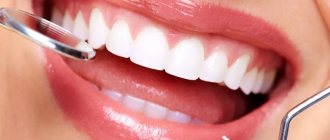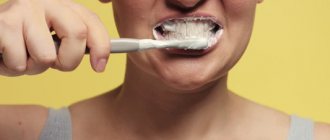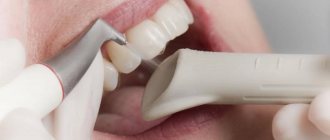Toothache causes a lot of inconvenience: and it’s not only about painful sensations that interfere with leading a normal lifestyle, but also about other restrictions for a person: lack of normal sleep, inability to eat comfortably, increased body temperature, inflammation of the gums, deterioration in general well-being, etc. d.
In order to relieve discomfort, a significant part of patients are interested in what to rinse a tooth with pain and how to do it correctly. But you should understand that rinsing for toothache can only have a temporary effect - to eliminate the problem, you need to contact a dental clinic for qualified help.
Why does tartar form on teeth?
There is always a certain amount of bacteria present in the oral cavity. This is fine. Moreover, bacteria help in digestion by starting the process of decomposition of food already during chewing.
Bacteria are found on the surface of all oral tissues, including teeth. The latter are protected from the harmful effects of microorganisms by enamel. Bacteria cannot penetrate through it.
But, nevertheless, nothing prevents bacteria from accumulating on the surface of the enamel. This biofilm is easily removed with everyday hygiene - brushing, flossing and irrigating. But in some cases - for example, due to untimely removal - the plaque begins to thicken. The reasons for this are:
- Excessive consumption of sweet foods, sugar, foods high in carbohydrates. All this creates a breeding ground for microorganisms;
- Use of low-quality hygiene products, untimely cleaning;
- Smoking. Tobacco smoke destroys the structure of the enamel, forming roughness, cavities and cavities on its surface;
- Irregularity of the dentition, malocclusion;
- Diseases of the digestive system, hereditary predisposition.
Bacterial plaque is easily removed. However, at some point it begins to petrify – that is, to become denser and acquire a mineral structure. And turns into tartar.
Tartar can no longer be removed with everyday hygiene products. It cannot be brushed or flossed off, and even a waterpik cannot destroy it. At the same time, bacteria in this colony continue to destroy both the tooth and the soft tissue located next to it. As a result, itching, swelling, bleeding begins, and increased sensitivity appears.
What can you do on your own to strengthen your enamel?
The best treatment is prevention. It is worth eliminating some bad habits, and the risk of thinning the enamel will significantly decrease: give up packaged juices, soda, sweets, too hard foods, use brushes with soft bristles, add foods with phosphorus and calcium to your diet. Particular attention should be paid to the choice of toothpaste and additional products (rinses, mouth balms, gels) - if you find it difficult to choose, you can trust the recommendations of professional dentists. Mineral and vitamin preparations, which should be included in your diet on a regular basis, will also not be superfluous.
In some cases, you can use folk remedies, strictly after consultation with your dentist. The most famous folk method is rinsing your mouth with a saline solution before going to bed (1 tablespoon of salt per glass of water). Propolis can also boast excellent remineralizing properties - you can use it in combination with other components or as an independent remedy (applying it to problem areas for 3-5 minutes).
Traditional methods provide only a temporary or minor effect, and you have to spend a lot of time to achieve the desired result.
Is it possible to remove tartar at home?
On the Internet and in printed publications you can find many recipes for removing stones yourself at home. This includes a mixture of black radish with lemon juice, decoctions of walnut bark, and other incredibly practical remedies that can be found in any garden.
But the problem is that they practically don't work. Decoctions of herbs and plants can have a positive effect on the soft tissues of the oral cavity, yes. But they won’t be able to cope with mineral deposits. Daily brushing will help remove bacterial biofilm, but not tartar. Attempts to soften mineral plaque with acid, as was done 25-50 years ago, will also not lead to anything good and can cause pain in already inflamed gum tissues and increase the sensitivity of the enamel.
Mineral tartar, unfortunately, cannot be completely removed at home. Not strawberry paste, not a mixture of black radish with lemon, not walnut bark decoctions, not soda, not a swab with hydrogen peroxide. Not a single one, even the most advertised brush or paste, can destroy mineral structures. But scratching, erasing healthy enamel or causing its increased sensitivity is quite possible.
The only effective and safe way to remove mineral plaque (tartar) from the surface of the enamel is to consult a dentist.
Proper mouth rinse after tooth extraction
The most important thing: in the first hours after tooth extraction, do not rinse your mouth under any circumstances! Reason: During intensive rinsing, you can wash out the blood clot, which closes the wound and helps protect it from infection and promote healing. Do not forget that the body is vulnerable after a tooth is pulled out. An open wound and, in fact, direct access to the circulatory system can lead to dangerous consequences!
If the clot has nevertheless been washed out or its formation has not occurred, then contacting the dentist is mandatory, since it is impossible to do without the use of an anti-inflammatory gel or other dosage form.
If the wound is bleeding, you can use a sterile gauze or cotton swab, previously soaked in a 3% solution of hydrogen peroxide, and place it on the wound for about half an hour. It is a hemostatic and healing agent. In case of prolonged bleeding, you should consult a doctor!
Rinsing with a solution of one of the decoctions of sage and chamomile helps to heal and reduce swelling. Please note: you should not rinse too vigorously - it should be gentle! An infusion of chamomile or sage should be kept on the gum for a while and then spit out. Do not forget that rinsing cannot begin until a day has passed after tooth extraction! The blood clot must be retained in the socket to avoid the formation of a dry socket, which can lead to alveolitis or gum inflammation. And a little more about nutrition.
After a tooth is removed, complications such as swelling of the cheek or gums are possible, so you need to take your nutritional choices very seriously! Food should be extremely gentle, liquid, not hot. After eating, you should also carefully rinse your mouth.
Do not use mouthwashes. Remember to brush your teeth properly to limit the growth of germs, but use a brush with soft bristles.
So, we have listed the basic rules for proper rinsing of the mouth after tooth extraction . We hope you found the article useful!
Professional tartar removal
The most modern, effective and gentle way to remove tartar is ultrasonic cleaning. It is carried out in dental clinics. Hygienists or periodontists specialize in such procedures.
Before performing ultrasonic dental tartar removal, the doctor, guided by the main medical principle “Do no harm!”, assesses the condition of the patient’s oral cavity. Determines whether there are any contraindications. Selects a suitable nozzle for the ultrasonic cleaning device.
During ultrasonic exposure, the structure of the mineral plaque is destroyed. And in most cases this happens from within. Tartar simply falls off the surface of the enamel, falls out of periodontal pockets and interdental spaces.
After this, the enamel is polished. This is necessary in order to prevent the appearance of plaque for a long time. The result is not only noticeable - it is literally tangible. You can run your tongue over the surface of the enamel - it will be clean, smooth and tactilely pleasant.
If tartar has penetrated deep into periodontal pockets or has damaged the integrity of the enamel, causing increased sensitivity, the dentist can also use local anesthesia. This is necessary to make the procedure comfortable and painless for the patient.
Is it possible to save a loose tooth?
If the cause of mobility is pathological processes in the gums (for example, periodontitis, gingivitis), then the doctor determines the infectious or non-infectious etiology, removes plaque and stone, and prescribes a course of therapy. If the cause of unsteadiness is an incorrect bite, they resort to orthodontic treatment (wearing trainers, braces).
Many patients wonder whether a loose molar can be saved with splinting. This is an effective technique that helps strengthen loose teeth by fixing them in one position. It comes in several types:
- extracoronary (the structure is applied and fixed with cement);
- occlusal (involves the use of an overlay or mouth guard);
- intracoronary (includes drilling a hole into which the splinting element is attached).
Most often, during the procedure, the doctor makes a small groove along the dentition into which the splint is placed. It is made of durable fiberglass and is hardly noticeable in the oral cavity. The doctor carefully closes the groove with photopolymer filling material, which allows maintaining aesthetics and functionality.
Splinting is divided into temporary and permanent. Temporary involves fixing structures for a specific period of time so that periodontal tissues have time to recover. The composition of splinting mixtures includes components that allow you to quickly restore stability to the dentition.
How to avoid tartar formation
Tartar prevention is a simple and affordable procedure. It will help protect not only from mineral plaque, but also from other dental diseases. To avoid the appearance of tartar, you must:
- Brush your teeth regularly. Twice a day, morning and evening, 2-3 minutes. You shouldn’t lean on the toothbrush so as not to scratch the enamel, but you shouldn’t move it like a feather either. Select the optimal pressing force;
- Use a variety of oral hygiene products. Flosses will help remove mineral plaque from the interdental spaces, irrigators - from periodontal (gum) pockets, rinses - get rid of harmful microorganisms;
- Use quality home hygiene products. Don’t skimp on toothpaste—dentist services can still cost more than the 50-100 rubles you managed to save;
- Eat 4-6 times a day, but little by little. You should not snack every few tens of minutes, especially snacks like chips, cookies or candy;
- Make it a habit to rinse your mouth with water after every meal. This will help wash away microorganisms, bacterial plaque and food particles;
- Eat more solid, healthy foods. For example, snack on carrots and apples. But you should refuse soft and high-calorie foods (cookies, cakes, etc.);
- Visit your dentist regularly.
These tips will help protect not only from tartar, but also from other dental problems. They will also have a positive effect on the gastrointestinal tract. This means that the rest of the body will say “Thank you.”
Our dental center will not only help you deal with tartar through professional cleaning using modern equipment, but will also teach you proper daily oral hygiene. The procedure will take about an hour, will be painless and calm, and immediately after its completion you will be able to delight those around you with your beautiful, confident and snow-white smile!
Recommendations for rinsing the mouth after tooth extraction
If it happened that you had to remove a tooth, then you should know what actions should be taken in the future, namely, rinsing the mouth after tooth extraction .
Never decide on your own which solutions should be used to rinse the mouth after tooth extraction. Consult your doctor first! Find out about the possible start of rinsing, the frequency, medications and strictly follow them.
Remember that after tooth extraction:
- It is forbidden to eat during the first 2-3 hours;
- You cannot create increased physical activity for the body as a whole;
- For 2 days you must give up cigarettes and alcohol;
- Only short-term exposure to the sun is allowed;
- You should avoid taking a hot shower or visiting a sauna.
